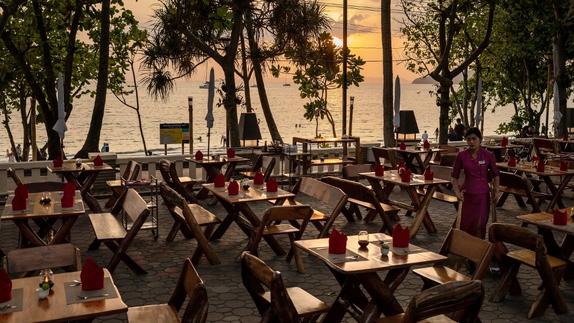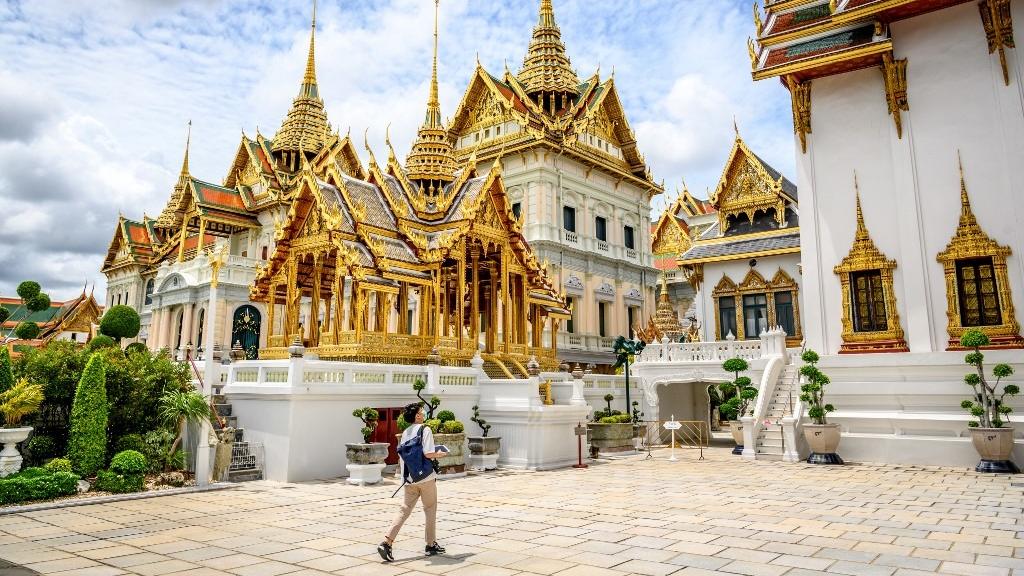 This photo taken on Feb 6, 2020 shows a waitress cleaning an area at a nearly empty restaurant at Ao Nang beach in Krabi province, Thailand. (NICOLAS ASFOURI / AFP)
This photo taken on Feb 6, 2020 shows a waitress cleaning an area at a nearly empty restaurant at Ao Nang beach in Krabi province, Thailand. (NICOLAS ASFOURI / AFP)
Despite postponements of tourist arrivals, Thailand hopes visitors from China will help kick-start its battered tourism sector which has been decimated by travel bans due to the COVID-19 pandemic.
The immediate reason for revival of optimism in the Thai tourism sector is a special charter flight that flew 150 Chinese tourists from Guangzhou to the Thai resort island of Phuket after Oct 25, instead of the original schedule on Oct 8.
They will the first foreign tourists allowed into Thailand on special tourist visas, or STV, under a conditional entry scheme for selected groups of foreigners endorsed by the government.
The immediate reason for revival of optimism in the Thai tourism sector is a special charter flight that flew 150 Chinese tourists from Guangzhou to the Thai resort island of Phuket after Oct 25, instead of the original schedule on Oct 8
ALSO READ: Luxury Thai hotels opening in pandemic bet on 5-star quarantine
Thailand’s Tourism and Sports Minister Pipat Ratchakitprakarn said on Oct 7 the tourists would fly directly to Phuket on a chartered AirAsia flight. Later, Thailand's National Security Council Secretary-General Natthaphon Nakpanit confirmed that tourists would only arrive in Phuket after the annual vegetarian festival.
The Phuket Vegetarian Festival will be taking place with light and sound and other performances in Phuket's major towns from Oct 17 to 25.
Phuket Governor Narong Woonciew also made an abrupt announcement on social media that he had decided to delay the arrival of tourists out of concern that local residents may fear going outdoor to celebrate the festival with the presence of foreign tourists.
The tourism minister also said another group of 126 Chinese tourists, from Guangdong, will fly into Suvarnabhumi International Airport, in Bangkok, on a chartered Thai Smile flight. This will be followed by tourists from the Scandinavian countries (Denmark, Norway and Sweden) and the 26-member Schengen countries – on a Thai Airways International flight on Nov 1.
Thailand’s tourism industry has recorded exponential growth in recent years, largely due to the influx of tourists from the Chinese mainland. But the pandemic has decimated tourism not only in Thailand but globally with airlines grounded and national borders closed.
ALSO READ: Thailand to slowly restart tourism with flight from China
Michael Langham, senior Asia country risk analyst for Fitch Solutions, said Thailand’s economy is highly dependent on tourism.
He told China Daily tourist receipts account for around 13 percent of gross domestic product and combined tourism and travel accounted for around 22 percent of GDP last year.
“Of this, Chinese tourists are by far the most significant for Thailand, accounting for 27.6 percent of arrivals and 28.1 percent of tourist receipts,” he said.
“If you take into account the large informal economy around the tourism sector, estimates put jobs related to tourism and travel at around one in six,” Langham said.
However, the knock-on effects to broader domestic demand, investment activity and government finances will amplify the overall impact of tourism, he said.
Sandra Seno-Alday, a lecturer at the University of Sydney Business School, said prior to the COVID-19 pandemic, Thailand had a large and successful tourism sector.
ALSO READ: Thailand to allow in Chinese fruit traders as lockdown eases
“The pandemic and subsequent travel restrictions devastated the sector. The Thai government’s response to the pandemic, however, has been robust and widely praised.”
Rajiv Biswas, Asia Pacific chief economist for global consultancy IHS Markit, said the pandemic has “become an extreme Black Swan event for the Asia-Pacific tourism industry, with international travel across the region having collapsed due to travel bans on foreign tourist arrivals by most Asia-Pacific governments, including in Thailand.” The term ‘black swan’ was coined by a former Wall Street trader Nassim Nicholas Taleb as a metaphor for an unexpected situation with potentially severe consequences.
 A tourist visits the Grand Palace in Bangkok on June 7, 2020, as it reopened for visitors following restrictions to halt the spread of the COVID-19 infections. (MLADEN ANTONOV / AFP)
A tourist visits the Grand Palace in Bangkok on June 7, 2020, as it reopened for visitors following restrictions to halt the spread of the COVID-19 infections. (MLADEN ANTONOV / AFP)
“Considerable uncertainties about the future duration and potential new waves of the COVID-19 epidemic continue to cloud the near-term outlook for the Asia-Pacific tourism and travel industry,” Biswas said.
Fitch Solution’s Langham said Thailand’s economy is likely to struggle to recover quickly, particularly given delays in the resumption of global tourism.
He said Thai authorities are keen to diversify the economy, but such reforms and investment will take time and given the ongoing political unrest in the country, policymakers may face increasing pressure.
Thailand has kept coronavirus infections low with just 3,559 cases and 59 deaths, but the nation’s economy has taken a hit from a ban on foreign visitors since April. The travelers now permitted to enter Thailand will be from countries deemed low risk by the government
ALSO READ: Elite Thai visa program aims to lure expats seeking virus haven
Thailand has kept coronavirus infections low with just 3,559 cases and 59 deaths, but the nation’s economy has taken a hit from a ban on foreign visitors since April. The travelers now permitted to enter Thailand will be from countries deemed low risk by the government.
“We are not opening the country, we are limiting the number of entries and will manage with wrist bands, apps (to track the tourists),” Prime Minister Prayuth Chan-ocha told journalists at a media briefing last month.
The government predicts just 6.7 million foreign visitors this year after a record 39.8 million in 2019.
Visitors to Thailand need health insurance and must produce a certificate for a negative coronavirus test done 72 hours before traveling to the country, and they will be tested twice while in quarantine for 14 days.
“Thailand’s protection system can prevent a second wave,” a spokeswoman for the government said.
“We have prevented local transmission for 100 days before,” she said, adding that had made Thailand attractive for visitors wanting to avoid infections.
READ MORE: New cases knock hopes of reviving Southeast Asia's holiday hotspots
Foreign tourist receipts are forecast to reach 4.5 billion baht (US$144.3 million) in the final quarter of this year, down 99 percent year-on-year, Chairat Trirattanajarasporn, president of the Tourism Council of Thailand, told a briefing last month.
The council predicts foreign tourist numbers this year will be down 83 percent from a year earlier.
Next year's outlook remains uncertain, Chairat said, although the official tourism agency predicts 20 million foreign tourists in 2021.
According to Biswas at IHS Markit, Thailand has been one of the most notable beneficiaries of the boom in Chinese tourism over the past decade. He said Chinese tourist visits to Thailand rose from 2.7 million in 2012 to 11 million in 2019.
“Chinese tourism has played an increasingly important role in underpinning the Thai tourism economy.
“Consequently, a crucial pillar of any recovery in Thailand’s international tourism sector will be dependent on the reopening of bilateral tourism between China and Thailand,” Biswas added.
Xinhua and Yang Han in Hong Kong contributed to this story.


